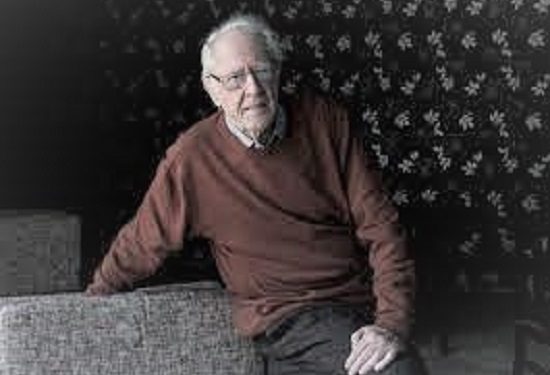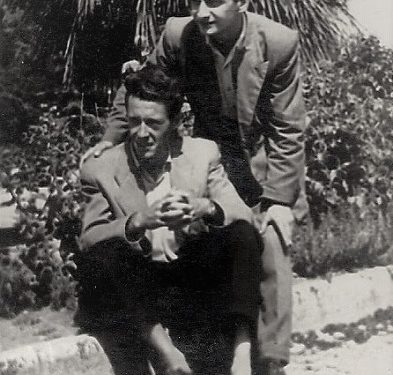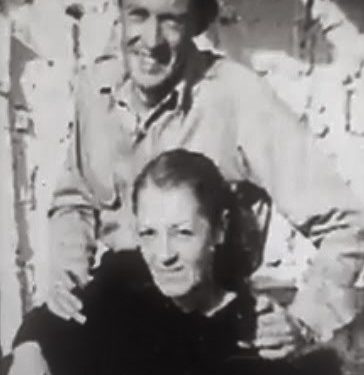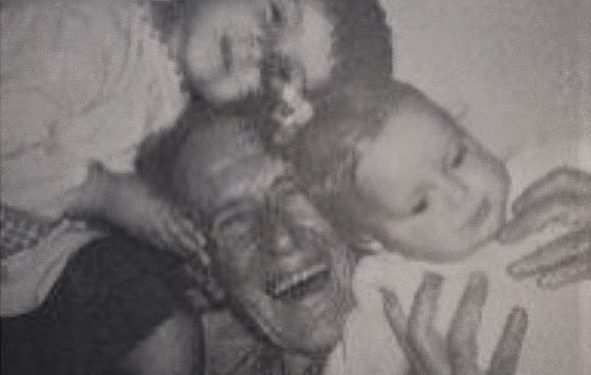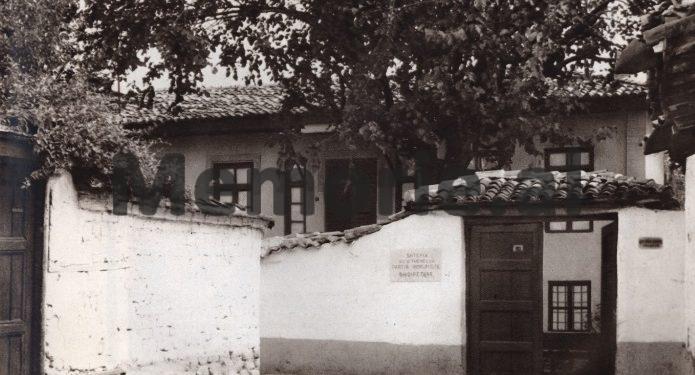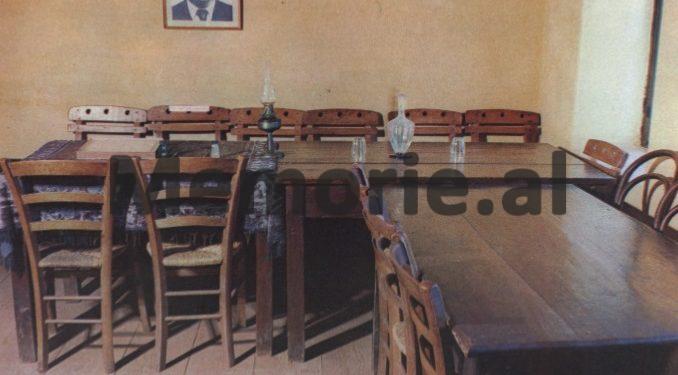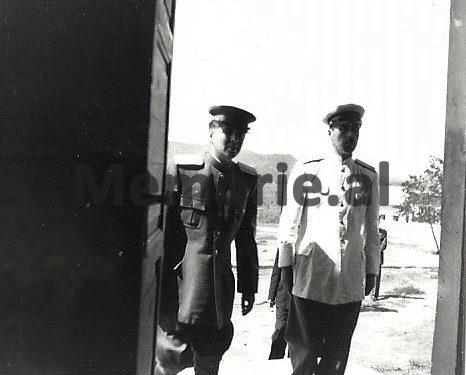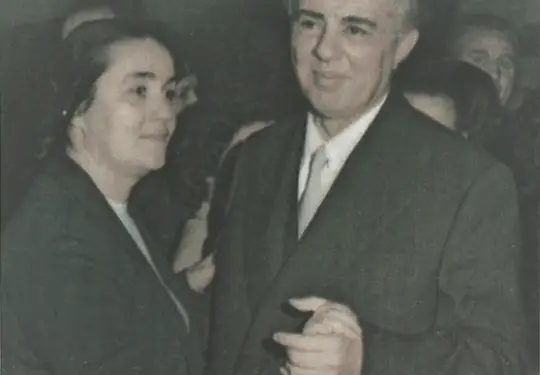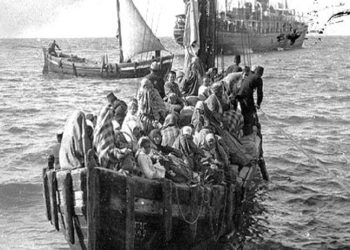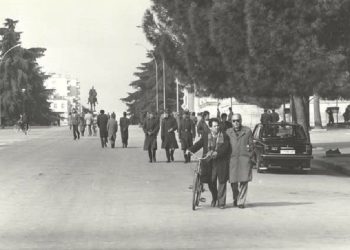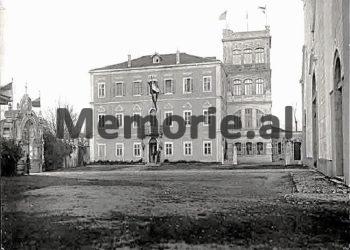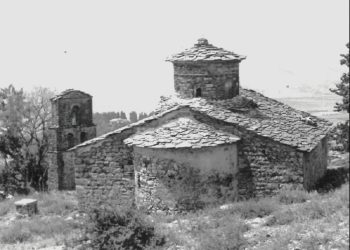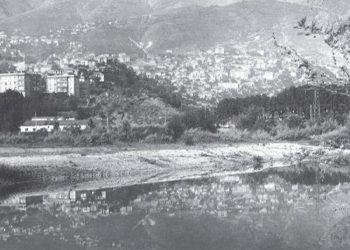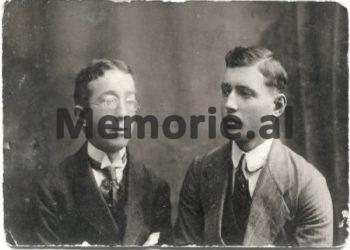From Amik Kasaruho
The first part
Memorie.al / Amik Kasaruho were born in Tirana in 1932. His father was shot by the communist regime of Enver Hoxha, after the bomb event in the Soviet embassy in Tirana, in 1951. At the same time, when he was alone 17 years old and a student at the high school in Tirana, Amiku is arrested and sentenced to 10 years in political prison, accused of agitation and propaganda, and by court decision, he was expelled from all schools in the country. After his release from prison, in the period 1956-1962, he lived in the city of Kavaja and then was interned with his family in the village of Gose i Kavaja, (where their family stayed until 1990, when the communist regime was collapsing). From 1956 to 1960, Amiku worked as a manual laborer in Elbasan, Lushnjë, Kavajë, then as a construction worker in Gosa, surveyor and as a construction technician in the State Construction Enterprise in Durrës. Meanwhile, during the 60s, he was also involved in translations, but his name was not included in the books and texts he translated. Only after the fall of the communist regime in the early 90s, it became possible to publish his writings and books. At the beginning of the 90s, he left Albania and after living for a long time in Italy (where he wrote several books), in 2009 he returned to Tirana, where for some time, he also served as an advisor to the President of the Republic. Also at this time, he also dealt with essays and translations. His books, such as “Anxiety of half a century”, (1997) “The price of a dream”, published in Italy (2000), “Between the sky and the prison”, “Escape from the fantasy of the gods” (Autobiographical novel), “Without grudges – Journalism of my life ” (2013), (which includes writings and interviews of the author, published in the Albanian press), have been translated into foreign languages and some have been honored with international awards. Likewise, Amik Kasoruho has also translated into Albanian works by foreign authors, such as: Pirandello, Isabel Allende, Harold Robbins, Patrick O’Brian, John Selby, etc. One of his last translations was “Atlas Revolt” by the well-known American writer and philosopher Ayn Rand. Kasaruho is the winner of the special jury prize in the Eks & Tra contest for immigrant women writers in 1999. In 2000, she received the “Civitas – Arberia 2000 Calabria” award for the maintenance of the Italian-Albanian arborist magazine “Katundi Ynë”. Kasoruho has been decorated by the President of the Republic with the title “Honour of the Nation”. He passed away on May 5, 2014, at the age of 82. The writing that we have selected here for publication is taken from his book “Anxiety of half a century”.
FRAGMENTS FROM THE ESSAY BOOK “A HALF-CENTURY ANXIETY”
The birth of a party or “Mortis Tua Vita Mea”!
Deceit
The next day, November 8, 1941, Albanians learned that the Albanian Communist Party had been secretly created in Tirana. Zinte thus began, with a significant clandestine action (quite understandable in those days of the fascist occupation of the country), the journey of that party which, for a large part of its activity, would shroud it in dense mystery. The most pronounced and absurd phenomenon of this tendency towards the secret, comes to light in the period 1945-1948 when, even being the only force in power, in practice it continued to remain clandestine. Although this word exists in the Albanian language, the term “illegality” was used, perhaps because, unconsciously, it concluded a judgment on the party’s activity.
In the fifty years of its life, the party left nothing undone: it did not recognize the merits of its pioneers, denied the allies of a time, swallowed principles that had been declared inviolable, called democracy the most unqualified totalitarianism, oppressed with a brutality invisible to any democratic movement, condemned the barbarisms in the Korean and Vietnam wars and was silent about the Stalinist “purges”, about the Siberian concentration camps, about the Katyn massacre, about the bloody suppression of the Hungarian uprising in 1956, about the blood of Chinese students in the square Tien An Men. He did not forget even once to hit the social injustices of the consumer society, but he forced his people to recognize spiritual and physical hunger.
During these fifty years, he made the history of his country, without having the courage to write it as it was being developed. It has claimed to interpret the interests of the nation, without asking and without respecting the people. It was not a party: it was an anxiety clinging to power. The politics of that party was not a social policy: it was a series of wrong choices and decisions, it was a new inquisition. The people paid the expenses, the nomenclature enjoyed the benefits. One day it will be known how much money and the value of arturines and precious stones that the families of Enver Hoxha and his associates, have deposited in foreign banks.
A party which denies its members the right to have civil courage and which asks them to obey blindly could not fail to become a source of painful injustice. But also the target of resentment.
This party became a tool of Enver Hoxha. If he did not create it, there is no doubt that he managed to conceive it according to his own intentions, transforming it into a force that did not have to think.
When the party was founded, Albania had one million inhabitants and only 26 years of national independence (in 1939, due to the fascist invasion, it lost the independence it had gained in 1912). Enver Hoxha was 32 years old and had a group of two hundred people behind him: before them lay a long road of almost half a century of absolute power.
If it was enough when they started to take the first steps, over time the heads of the founders themselves began to fall. Although they were later called traitors, the credit also goes to the leaders or members of the first communist groups, who did not join their ranks, who then joined the party.
Thus, along with Ali Kelmendi, Halim Xhelos, Qemal Stafa, Vasil Shanto (highly respected by the party), the rejected also take their place: Sadik Premte, Anastas Lula, Zoi Fundo, Zef Mala, Niko Xoxi and others. It is not enough to say that every revolution is a mother who tears her children apart, it must be added that sometimes it is the sons who tear the mother apart. Perhaps this is the case of the famous popular revolution in Albania, which was betrayed by its own leaders.
The struggle for absolute power strips the one who participates in it of any sense of camaraderie (not to mention friendship and honesty). The year that Hoxha died, at the head of the Party, there was not even one of the historical leaders of the Communist Movement left: most of them had not died of natural death and those who had not died, again ended badly…!
Facts and crimes
Tragic farces
On the economic level, the foundations of a largely nationalized finance were laid. The confiscation of private industry (the little that existed), the large estates, the banks, and the state accumulation of liquidities, the imposition of extraordinary taxes, and the cancellation of foreign concessions: all these form the skeleton of the newly born state.
On the social level, it was intended (or at least so it was said), to create an egalitarian society, from which the ruling class would be left out, which, in a short time, would implement a lifestyle of its own, based on the privileges of sultans. Under the pretext of giving everyone the opportunity to lead a dignified life, this philosophy, on the contrary, created a leveling of material values, creating a pale and skeletal society, and flattened moral values, creating a terrifying void where they had strong roots of sound moral precepts, inherited from a history of noble efforts for freedom and from religions that had defined a moral and ethical code.
On the political level, since the first days, the preferences for the European East and mainly for the neighboring Yugoslavia were being revised. The choice that had catapulted Albania to the Eastern Hemisphere had cut it off from Europe, even before it was officially aligned with the Slavic states.
Inside the country, that war had begun that, over time, would be called the class war, a way to justify the use of weapons against the unsubdued, who, for their part, continued to fight in the mountains (the mountains, for the Albanians, have been a symbol of freedom all their lives).
Behind this new state were hidden the intentions of the Serbs, the thirst for power of the new ruling caste and a people disoriented, taken by surprise, deceived in their hopes and abandoned to their fate, deprived as it were of those personalities who could oppose the communist power.
The Përmet Congress had given a political direction but not legal credibility to the new state. This gap had to be filled as soon as possible. Therefore, the first general election was scheduled for December 2, 1945. In the first days of 1946, the Constituent Assembly was elected.
Later it was transformed into the People’s Assembly, which was not really an assembly (because no one discussed the proposals from above) and even less popular.
It was the first election with direct voting, for the first time the right to vote was shared between women and soldiers. But it was the first of a series of farcical elections, which Albanians would get used to for four decades.
Due to the large number of illiterates, the vote was expressed with a rubber bead that citizens could throw into one of two boxes, one for the votes going to the Front and the other for the opposition. Candidates outside the Front list (counted on the fingertips), not only did not win, but were persecuted by the regime.
One example is enough: the lawyer Koço Dilo, who had run for office in the city of Tirana, shortly after the elections, was imprisoned and accused of activities against the people; later he was interned in Grabjan, in the district of Lushnje, together with the whole family.
One can guess what electoral fraud was done: rubber beans could easily be passed from one box to another, thus starting that stale comedy of falsified results without a single point: the percentage of voters would always be more more than 90% and voters for Front candidates would almost all be more than 99%.
The Opera and Ballet Theater was later located in the building where the Constituent Assembly held its meetings for nearly twenty years. History wanted to forgive a highly symbolic similitude, between the establishment of the communist state and stage comedy!
The Constitutional Assembly was responsible for the exercise of a legal and legislative power, which would not enter the work of a state that had no respect for this type of power.
On January 11, 1946, Albania was declared a Republic, with the designation “popular” to refute the opinion, according to which a state run by communists, could only be a communist republic. The game had begun: now it had to be carried forward, according to the rules established since the time of the war.
The Communist Party of Albania continued to remain in the shadows, it was never mentioned, as if it did not exist at all. Under the name of the Democratic Front, it continued to rule the entire life of the country with an iron hand. In fact, its general secretary was the President of the General Council of the Democratic Front.
Its Central Committee was hidden behind the General Council and the meetings of the basic organizations of the party were disguised as the assemblies of the Front itself. Although this was a funny secret, this farce continued again for another four years after liberation.
Something of this philosophy of clandestineness remained in the life of the Party of Labor of Albania. Almost always, the meetings of its basic organizations were held behind closed doors, perhaps to avoid the complex of the one who has to give explanations to others about what he does. Falsehood, fraud, denunciation, accusation, intrigue, needs darkness to be fully effective.
On the other hand, the lack of transparency was also the best way to discharge responsibilities, assigning them to the amorphous mass of the party and not only to the members of the Central Committee, whose members continued to exercise an absolute as well as arrogant power. Effectively 45 years later, it would be said that the mistakes of the past were committed by the party, understood as a mass entity and not by its leaders. A really genius prediction!
The new aristocracy…!
At least during the early times, the leaders of the NPSH were not seen in public, except for the II Anti-Fascist Youth Congress, at the beginning of 1946, the Balkan Games (October of the same year) and any mass demonstration ( as commemoration of the People’s Martyrs’ Day). They had a lot of work?! Were they afraid of an assassination? Was this an intervention period so they could meditate?
One thing can be said for sure: neither it nor later, except at some congress or some parade, the chiefs did not appear in public. They were set apart, locked in a golden privacy, completely and forever isolated.
To live, Enver Hoxha did not choose the Royal Palace of Zog, and not because he was against the sultanate, but because that building, even though it was located in the center of the city, was isolated and difficult to supervise. On the other hand, it was an already outdated building without modern amenities. He chose, as a residence, the house of the former prime minister of Zog, Koço Kota, a beautiful and spacious villa in New Tirana.
With dizzying speed, that building turned into a palace. Just as easily, without any law being announced to legitimize the action, all the surrounding houses were confiscated, which were destined to become the houses of Hoxha’s proselytes, thus creating the neighborhood that was called “Blloku”, a living sign of distancing of new governors from ordinary citizens.
In a short time the “Block” came and became an island in the middle of the capital, guarded by armed guards to the teeth and where no one could go, except those who lived inside it and the people who served there. This bloc had its own development, its own life, and its own destiny: there was not even a single point of contact with the life and destiny of the country and the people.
And it can be assumed, without risking being wrong, that underground tunnels have been built in that area of the city that creates a network of shelters in case of danger. In that “Block” they found and nurtured an ideal environment for brazen nepotism and unbridled favoritism.
“Marx and Engels were of the opinion that communism could triumph through a revolution on a world scale, Lenin proved that communism could triumph in a single country, Enver Hoxha proved that a communist society can be built in just one neighborhood” ! Wrote Mitro Çela, one of the first to expose the injustices and crimes of the regime, in the days of the democratic movement of 1990.
The Marxist dialectic worked directly for the torches of Albanian Marxism, revealing those feudal principles that he said he wanted to fight. The desire to give themselves rights that did not belong to them was deeply rooted in the leaders of the Albanian Labor Party and especially in the mindset of the one who one day managed to be called the Commander.
Simply, megalomania…!
For the sake of truth, it must be said that Enver Hoxha never performed the functions of a military leader, for the sole reason that he had no preparation for this. Enver Hoxha was declared Commander-in-Chief of the Armed Forces, after the liberation, even though it was not clear who was the real head of state, the President of the Presidium of the People’s Assembly or the Prime Minister (who was also the general secretary of the party)!
This self-celebrating strategy had started in July 1943, when, by the Labinot Conference, the General Staff of the Anti-Fascist National Liberation Army was appointed. The task of the commander was entrusted to Spiro Moisiu, a career soldier who had joined the ranks of the partisans, and Enver Hoxha, as a representative of the PKSH, was appointed political commissar of this headquarters.
In the hierarchy of the Anti-Fascist National Liberation Army, the post of commander-in-chief never existed and it is not known by whom and why it was attributed to Enver Hoxha. This is more of an honorary title than a real function. Hoxha usurped the merit of being announced as the head of an army that represented almost 7% of the population.
It didn’t take long and it became clear that he was the layer of a half-hearted intellectual and a coward, who stole the merits of others, without a spine in front of the powerful as well as arrogant with those under him. He could sign death decisions with the sweetest smile on his lips and, at the same time, fall prey to the mania of persecution, afraid of successive conspiracies.
Distrust of others became an unchanging rule of his life. He was a mediocre being who wanted to live as a man chosen by Fate. Thus was born a quasi-monster.
Political Secretary (or General) of the Central Committee of the PPS, Prime Minister, Minister of Foreign Affairs, Minister of Defense, Commander-in-Chief of the Army, Chief of Staff, Chairman of the General Council of the Democratic Front, these were the simultaneous attributes of Hoxha during the first years after the war (by the end of his life he had only held the office of general secretary of the party and that of the army commander).
All these not only proved his boundless megalomania, but also the mistrust he nurtured towards all those around him. “Beso e controllo”, was the contradictory slogan that was used a lot during those times and that constituted the guiding line throughout Enver Hoxha’s time in power.
Other chiefs lived and acted in his shadow. They were chess pieces that he moved at will. For example, Omer Nishani, the first president of the Presidium of the People’s Assembly, how long did he last in that office, which was just an insignificant shadow and a symbol of the legislative power.
Hysni Kapo, a party activist and one of the organizers of the resistance in the province of Vlora, stood by Enver Hoxha until he died. Known during the War as “Besniku”, he stayed like that until he managed to become his deputy. An officer immediately after the liberation, he later moved to diplomacy (as ambassador in Belgrade and Moscow), was Minister of Agriculture, then of Economy and, finally, under Prime Minister.
In the close circle of loyal people, there was also Gogo Nushi, of worker origin, former member of the Communist Party of France, commander of the guerrilla units of Tirana during the War. After liberation, he held various party duties, but he did not excel either in wisdom or in political acumen. He finished his career as the president of the State Trade Unions. When he died, as happened later with Kapo, state funerals were held.
Apart from Kapo and Nushi, from 1944 to 1985, the Albanian people honored only two other political personalities with state funerals: Alqi Kondin, member of the Central Committee of the Communist Party and general secretary of the Communist Youth, and Myslim Peza. All others have died as traitors.
The enemies of the party were the enemies of Enver Hoxha. Or rather, Hoxha’s enemies were the party’s enemies. Mayakovsky’s well-known saying (in the poem Vladimir Ilyich Lenin) “We say PARTY and we mean LENIN and when we say LENIN, we mean PARTY”, which was adopted word for word by Hoxha.
War on many fronts
In the first years of the Republic, when nothing was definitively fixed and when the internal guerilla mortgage was weighing on tomorrow, as well as when the Western powers had not officially recognized the Albanian government, the resistance of the regime’s opponents began. The situation remained cloudy.
Every day more and more Albania was becoming a place of insecurity; there were still no clear and definitive laws; the new Penal Code was not yet edited and the old one was used only in parts.
Gender was judged and punished based on unwritten laws; assets and goods were confiscated when the government had not yet sanctioned the criteria to support this type of measure. The lawless state arbitrarily decided the fate of the citizens and this was the prelude to the later state, when laws were issued to serve the despotic state.
Even the symbol of the divinity of justice was removed from all courts: its scales were no longer used; the sword had passed into the hands of judges, of whom only a few had studied law (if we refer to the years ’50s – ’60s).
Within the state borders the situation was not yet under complete control. The anti-communist partisan movement, which had moved through the mountains, found support in the people, in the same people that had supported and helped the anti-fascist partisans. Punishments for those who provided help were extremely harsh and led to a general climate of suspicion and denunciation.
Hundreds of houses were burned or razed to the ground. Thousands of people were shot in the provinces of Dibra and Mirdita, in Dukagjin, in Krujë, Mat, in Malësi i Madhe and in Central Albania. Just as many were exiled or imprisoned. Memorie.al
The next issue follows




